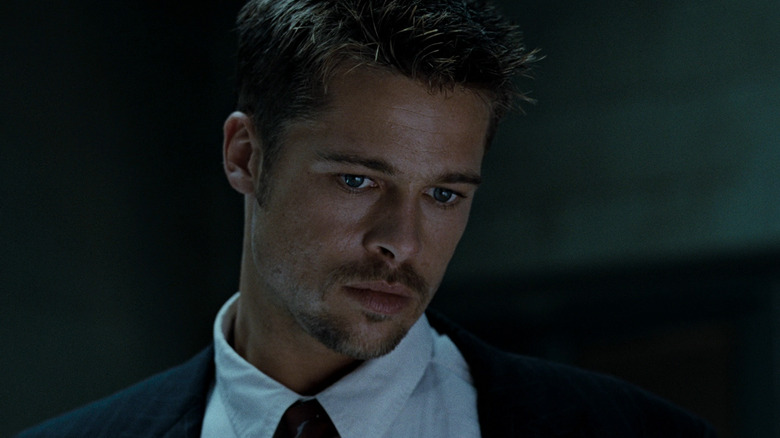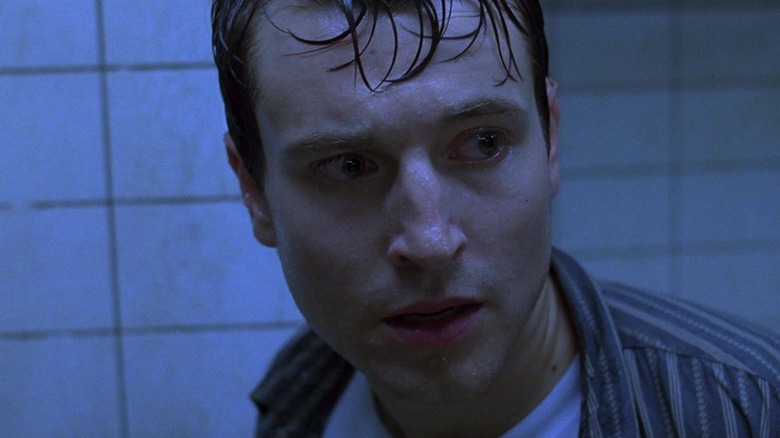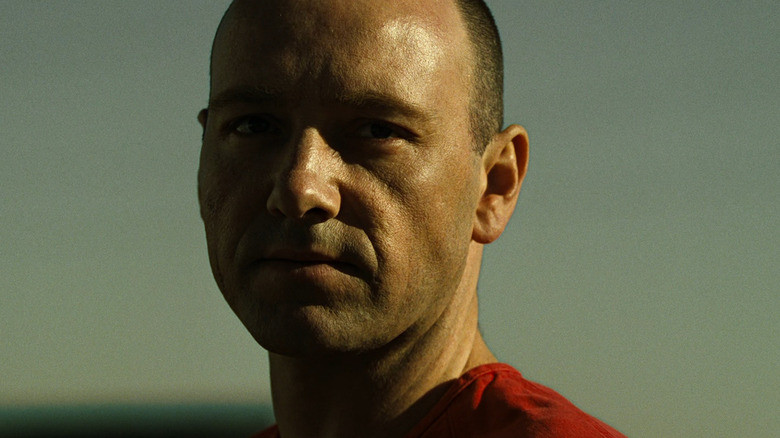David Fincher Feels That This Classic Horror Movie Hurt Se7en's Legacy
Of all the victims in David Fincher's "Seven," Lust is the one that makes me shudder the most. We don't see much of the deceased, and that makes it all the more horrifying. Instead, Fincher lets our imagination do all the work, later revealing a polaroid of the custom-made murder weapon and subjecting us to the sickening testimony of the brothel client who was forced to participate at gunpoint. It was also the scene I thought about in later years when I first watched 2004's "Saw." For me, the combination of baroque cruelty and the extreme sexual aspect provide a through-line from 1990s serial killer movies like "The Silence of the Lambs" to the torture porn subgenre James Wan's low-budget hit is often credited with kick-starting — and Fincher isn't happy with that association at all.
"It was offensive to me on a certain level that when 'Saw' and those other movies came out, people said, 'Well, torture porn really started with 'Seven,'" he told Playboy in 2014, adding a "F*** you" for good measure. Noting the film was "lurid" on purpose, he further emphasized that he and writer Andrew Kevin Walker were "extremely conscious of the fact that we were talking about torture, but we never actually showed it."
"Saw" itself is pretty mild compared to what came after, but there's little doubt it paved the way for much grislier and more nihilistic horror movies, leading David Edelstein to coin the term "torture porn" in 2006. Citing Greg McLean's "Wolf Creek," Rob Zombie's "The Devil's Rejects," and "Eli Roth's "Hostel" (all released in 2005), he likened them more to gruesome '70s exploitation flicks than '80s and '90s slasher/serial killer films. But does "Saw" fit in this category? And is Fincher right to suggest it tarnishes the legacy of "Seven"?
What happens in Saw?
"Saw" has a premise that might've sprung straight from the mind of John Doe (Kevin Spacey) in "Seven." Smug oncologist Lawrence Gordon (Cary Elwes) and wastrel photographer Adam (the film's writer, Leigh Whannell) awaken to find themselves shackled in a scummy bathroom. Between them is a corpse holding a gun and a tape recorder. They also find tapes in their pockets. Retrieving the recorder, Lawrence's tape instructs him to kill Adam by 6 p.m. or his wife and daughter will die. They also find two hacksaws incapable of cutting through their restraints, leading Lawrence to deduce they're meant to cut through their own legs instead. He also suspects this is the work of the Jigsaw Killer, who previously tried to frame him for several gruesome deaths.
"Seven" was clearly a major inspiration for the film's grungy locations, fiendish serial killer with a message, and unexpected twist ending. The format is tweaked a little; while Doe uses the seven deadly sins for a moral sermon about modern society, Jigsaw's goal is more existential. Ostensibly, he aims to teach his victims to appreciate life by forcing them to make agonizing choices to survive.
"Saw" is an effective horror-thriller with an intriguing mystery, but its sequels leaned heavier into the deathtrap aspect. That's why the franchise gets lumped in with torture porn – it became less about its characters and more about the gore. The distinction is subtle but important; while "Saw" has its share of grisly deaths, they're in service of a gripping story. In later installments and in torture porn in general, viewers are encouraged to get off on the violence itself. And that's why David Fincher is angry about the association — "Seven" had the restraint and the artfulness to hold back on the cheap shots.
Is Fincher right to be upset about Seven's connections to torture porn?
It's easy to see why David Fincher would be protective of "Seven." The movie allowed him to prove himself as a filmmaker after the troubled production of "Alien 3," and he grabbed the chance with both hands. Not only is it a superbly made horror-thriller with cracking performances and an unforgettable twist ending, but it's also a fantastic piece of storytelling. It's a film I return to every few years and still find myself carried away by, even though I know how it plays out.
But while I get Fincher's point, I can't help feeling he's being over-sensitive. No piece of art is completely original, and there's no telling what your own work might inspire down the line. It's not like "Seven" wasn't also influenced by previous movies, either. The film might not even exist if "The Silence of the Lambs" hadn't been such a massive critical and commercial success, ushering in the '90s serial killer boom along the way.
Fincher himself has cited "Psycho" and William Friedkin as influences on "Seven," and the film's procedural element can be traced all the way back to Fritz Lang's "M." Lang's 1931 classic paved the way for every serial killer thriller since, and the master filmmaker was also a major proponent of German Expressionism. The latter's influence on "Seven" is a huge reason why the film has dated better than other '90s movies, as noir never gets old.
Ultimately, "Seven" may've opened the door for "Saw" and its imitators, but Fincher shouldn't worry about it. Three decades after it shocked audiences, "Seven" is still a nailed-on classic. People will still be talking about it in another 30 years when torture porn has become a macabre footnote in cinema history.


